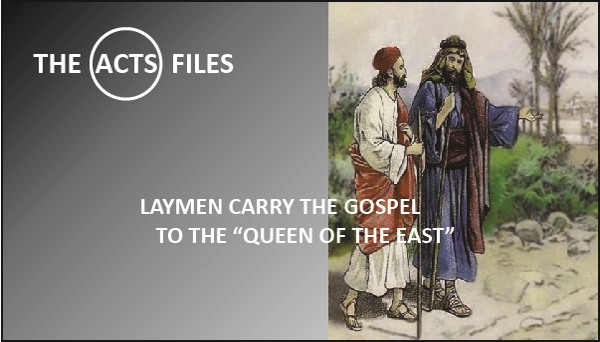By Tyson Thorne

Due to the persecution that broke out over Stephen’s execution (chapter 7) many Jesus-following Jews left Jerusalem for friendlier shores. Some of those friendly shores included Phoenicia (a region north of Israel), Cyprus (a large island off the coast of Israel) and even as far north as Antioch in Syria. Antioch was the third largest city of the Roman Empire, behind only Alexandria and Rome itself. When the Romans conquered the city in 64 B.C. it became the capital city of the Roman province of Syria. Located 15 miles from the coast, it was served by the port city of Selucia. Travel from Jerusalem to Antioch was a horrific journey by land, but an easy and quick trip by sea.
It is no wonder then that two Jews from completely different parts of the world, who became followers of “The Way” in Jerusalem, fled to Antioch once Saul’s persecution began. In Antioch there were people from all over the world. There were Jewish communities, and Greek neighborhoods, Roman portions and suburbs. Five miles from Antioch was Daphne, a city famous for its association with Artemis and Apollo worship. Upon arriving in the city known as the “Queen of the East” the two men decided against soliciting the Jewish community, perhaps fearing that further persecution might break out. Instead they went to the Greeks and, living among them, told them about Jesus the Messiah.
Acts 11.22 makes it clear that the success of the gospel in penetrating this community was not due to the men’s ability to communicate, their fervor, or even display of signs and wonders. Instead, we are told “the hand of the Lord was with them.” This doesn’t indicate that these men were terrible communicators and had no skills whatsoever, only that it was the work of God around and through them that influenced and drew the Greeks to the truth. The same is true today, often we present Jesus in a way that isn’t slick or practiced, but God uses our sincerity and obedience and causes a great work to take place.
What is of great interest, however, isn’t how these Greeks heard the message, but rather how they responded to it. The Greek is very interesting and very precise in its description. In the Greek there is a great sense of activity associated with their belief. English doesn’t allow for such constructs but the translators have done a fair job saying, “a great number who believed turned to the Lord.” The problem with this phrasing is it could lead someone to think that one can believe and not turn, which is not what the passage is indicating. We must expand the phrasing in English to accommodate Luke’s intent.
In Greek philosophy when one accepts a truth they then reason out the repercussions of that truth and change their lifestyle and other teachings to accommodate that truth. This is what is happening in verse 23, the Greeks accepted that Jesus is the Truth and consequently and immediately began to live in accordance with that truth. This is a discipline largely lost today as people have come to accept many “truths” some of which are even contradictory, and live in a way that satisfies themselves even if doing so is opposition to their “beliefs”. We all ought to strive for consistency in our thinking and our living.
The work God did through the Cyprian and Cyrenaic men must have been substantial as a report of the gospels acceptance made its way back to Jerusalem, the center of Christianity to the Jews. Intrigued, the apostles sent Barnabas to investigate. We don’t know if the report included the fact that the new believers were Gentiles, but either way thanks to Peter and Cornelius the church had already considered the outbreak of the Messianic message to non-Jewish cultures and accepted it as God’s intention. When Barnabas arrived he was well received and overjoyed at God’s work.
In Greek there is no such thing as a “run-on” sentence. They attached endings to words to indicate what action was being performed by each object. That makes translation a little dicey sometimes but the intension of verses 23 and 24 is to say that Barnabas was overjoyed for three reasons: (1) he was overjoyed because he was a good man, (2) because he was full of faith and the Holy Spirit, and (3) because of the significant number of people who had put their trust in Jesus. Out of this joy he encouraged the new believers to remain true and devoted to Jesus, indicating again the dual nature of belief and action.
We are not told how many new believers were present, but it was apparently enough that Barnabas felt he needed help. Due to the intellectual nature of the new believers, no one was better qualified to help disciple this new breed than Saul. He left Antioch to search for the controversial apostle and, upon finding him, brought him back to Antioch.
|
|
|
